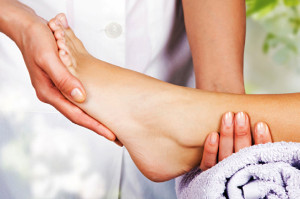Blog
Foot Surgery as a Successful Treatment Option
 If chronic pain is present in the feet, surgery may be an option to consider. One type of surgery that is referred to as arthroscopic debridement may help patients in the beginning stages of arthritis. This procedure removes any inflamed tissue that has developed on the joints and surrounding areas. If you have a bunion and wearing shoes becomes painful, permanent removal of the bunion could be a successful treatment option. Many people experience heel pain. This may be indicative of plantar fasciitis, or heel spurs. These patients may find it beneficial to undergo heel surgery, which can be helpful in correcting the condition. Aftercare for most foot surgeries will typically consist of keeping the foot elevated, in addition to wearing a splint or bandage on the recovering foot. If you are considering any type of foot surgery, it is suggested to consult with a podiatrist who can properly guide you.
If chronic pain is present in the feet, surgery may be an option to consider. One type of surgery that is referred to as arthroscopic debridement may help patients in the beginning stages of arthritis. This procedure removes any inflamed tissue that has developed on the joints and surrounding areas. If you have a bunion and wearing shoes becomes painful, permanent removal of the bunion could be a successful treatment option. Many people experience heel pain. This may be indicative of plantar fasciitis, or heel spurs. These patients may find it beneficial to undergo heel surgery, which can be helpful in correcting the condition. Aftercare for most foot surgeries will typically consist of keeping the foot elevated, in addition to wearing a splint or bandage on the recovering foot. If you are considering any type of foot surgery, it is suggested to consult with a podiatrist who can properly guide you.
Foot surgery is sometimes necessary to treat a foot ailment. To learn more, contact Dr. Kevin Davis of Davis Foot & Ankle Centers. Our doctor will assist you with all of your foot and ankle needs.
When Is Surgery Necessary?
Foot and ankle surgery is generally reserved for cases in which less invasive, conservative procedures have failed to alleviate the problem. Some of the cases in which surgery may be necessary include:
- Removing foot deformities like bunions and bone spurs
- Severe arthritis that has caused bone issues
- Cosmetic reconstruction
What Types of Surgery Are There?
The type of surgery you receive will depend on the nature of the problem you have. Some of the possible surgeries include:
- Bunionectomy for painful bunions
- Surgical fusion for realignment of bones
- Neuropathy decompression surgery to treat nerve damage
Benefits of Surgery
Although surgery is usually a last resort, it can provide more complete pain relief compared to non-surgical methods and may allow you to finally resume full activity.
Surgical techniques have also become increasingly sophisticated. Techniques like endoscopic surgery allow for smaller incisions and faster recovery times.
If you have any questions please feel free to contact our office located in Springfield, TN . We offer the newest diagnostic and treatment technologies for all your foot and ankle needs.
Foot Massages May Help to Reduce Anxiety
Foot massages have become increasingly popular, and research has indicated it may help to heal ailments in other parts of the body. When the toes are curled, and the portion of the foot is massaged under the ball of the foot, this may aid in reducing anxiety. Patients who are suffering from chronic pain in the body may find that rolling the sole of the foot on a tennis ball could bring mild relief. Lower back pain may be diminished when the pressure points in the arches are massaged, followed by firmly rubbing the entire sole of the foot. If you are diabetic, it is suggested that you seek the counsel of a podiatrist who can provide information about how nerves that are damaged can be affected by massaging.
Foot therapy is often necessary for those recovering from either foot deformities or foot injuries. If you have concerns regarding therapy, consult with Dr. Kevin Davis from Davis Foot & Ankle Centers. Our doctor can provide the care you need to keep you pain-free and on your feet.
Most Common Injuries
People who are active or athletes are prone to a variety of injuries. Therefore, it is often important to take part in physical therapy in order to quickly get back on the right track.
What to Do When Injured
Physical Therapy – This specialized treatment will focus on the affected area, speeding up recovery and the overall healing process. It is a proven method that has helped millions of people return from any injury.
During physical therapy you will undergo regimented training to get back into full form. Training is often very difficult, especially at first when the foot feels weak. Physical therapy often involves:
Basic stretching and twisting exercises – getting the feet’s mobility and flexibility up.
Massaging – the therapist will massage the injured area in order to activate the muscles and relax them.
Strengthening Exercises – this allows the muscles in the affected area to regain their full strength, a vital step towards full recovery.
If you have any questions please feel free to contact our office located in Springfield, TN . We offer the newest diagnostic tools and technology to treat your foot and ankle needs.
What are Achilles Tendon Injuries?
The  Achilles tendon is a fibrous band of tissue that links the muscles from your calf to your heel. The flexibility of the tendon is key for jumping, running, and walking. The Achilles bears a lot of stress and pressure during everyday activities, as well as during athletic and recreational play. If it becomes inflamed, swollen or irritated, it is called tendonitis. The most common risk factors for Achilles tendon injuries are starting a new sport, an increased amount or intensity of an activity, bone spurs on the heels, tight calf muscles when starting an activity, and wearing improper shoes when exercising. Common symptoms of Achilles tendon injuries include the following: pain that gets worse while being active, a stiff/sore Achilles tendon when first getting up in the morning, thickening of the tendon, and difficulty in flexing the affected foot. Some treatment options are rest, physical therapy, specific exercises to strengthen the calf muscles, and anti-inflammatory drugs for pain relief such as ibuprofen or naproxen. An Achilles tendon injury may be prevented by stretching before exercising and by wearing the correct shoes. It may be suggested to cease exercise on uneven surfaces and stop activities that cause pain. If you have an Achilles injury or if you would like to take precautions to prevent an Achilles injury, please consult with your local podiatrist.
Achilles tendon is a fibrous band of tissue that links the muscles from your calf to your heel. The flexibility of the tendon is key for jumping, running, and walking. The Achilles bears a lot of stress and pressure during everyday activities, as well as during athletic and recreational play. If it becomes inflamed, swollen or irritated, it is called tendonitis. The most common risk factors for Achilles tendon injuries are starting a new sport, an increased amount or intensity of an activity, bone spurs on the heels, tight calf muscles when starting an activity, and wearing improper shoes when exercising. Common symptoms of Achilles tendon injuries include the following: pain that gets worse while being active, a stiff/sore Achilles tendon when first getting up in the morning, thickening of the tendon, and difficulty in flexing the affected foot. Some treatment options are rest, physical therapy, specific exercises to strengthen the calf muscles, and anti-inflammatory drugs for pain relief such as ibuprofen or naproxen. An Achilles tendon injury may be prevented by stretching before exercising and by wearing the correct shoes. It may be suggested to cease exercise on uneven surfaces and stop activities that cause pain. If you have an Achilles injury or if you would like to take precautions to prevent an Achilles injury, please consult with your local podiatrist.
Achilles tendon injuries need immediate attention to avoid future complications. If you have any concerns, contact Dr. Kevin Davis of Davis Foot & Ankle Centers. Our doctor can provide the care you need to keep you pain-free and on your feet.
What Is the Achilles Tendon?
The Achilles tendon is a tendon that connects the lower leg muscles and calf to the heel of the foot. It is the strongest tendon in the human body and is essential for making movement possible. Because this tendon is such an integral part of the body, any injuries to it can create immense difficulties and should immediately be presented to a doctor.
What Are the Symptoms of an Achilles Tendon Injury?
There are various types of injuries that can affect the Achilles tendon. The two most common injuries are Achilles tendinitis and ruptures of the tendon.
Achilles Tendinitis Symptoms
- Inflammation
- Dull to severe pain
- Increased blood flow to the tendon
- Thickening of the tendon
Rupture Symptoms
- Extreme pain and swelling in the foot
- Total immobility
Treatment and Prevention
Achilles tendon injuries are diagnosed by a thorough physical evaluation, which can include an MRI. Treatment involves rest, physical therapy, and in some cases, surgery. However, various preventative measures can be taken to avoid these injuries, such as:
- Thorough stretching of the tendon before and after exercise
- Strengthening exercises like calf raises, squats, leg curls, leg extensions, leg raises, lunges, and leg presses
If you have any questions please feel free to contact our office located in Springfield, TN . We offer the newest diagnostic tools and technology to treat your foot and ankle needs.
Why Do My Heels Hurt and What Can I Do About It?
Heel pain is a rather comm on foot problem. The pain will usually occur under the heel, towards the front of the heel, or just behind it, where the Achilles tendon connects to the heel bone. The most common cause of heel pain is plantar fasciitis, which is pain under the heel. Other causes include arthritis, heel bursitis and bumps, tarsal tunnel syndrome, stress fractures, Sever’s disease and Achilles tendinitis. The most common remedies for heel pain are rest, proper fitting footwear and applying ice to the afflicted area. If you are experiencing some kind of heel pain, it is suggested to go see a podiatrist.
on foot problem. The pain will usually occur under the heel, towards the front of the heel, or just behind it, where the Achilles tendon connects to the heel bone. The most common cause of heel pain is plantar fasciitis, which is pain under the heel. Other causes include arthritis, heel bursitis and bumps, tarsal tunnel syndrome, stress fractures, Sever’s disease and Achilles tendinitis. The most common remedies for heel pain are rest, proper fitting footwear and applying ice to the afflicted area. If you are experiencing some kind of heel pain, it is suggested to go see a podiatrist.
Many people suffer from bouts of heel pain. For more information, contact Dr. Kevin Davis of Davis Foot & Ankle Centers. Our doctor can provide the care you need to keep you pain-free and on your feet.
Causes of Heel Pain
Heel pain is often associated with plantar fasciitis. The plantar fascia is a band of tissues that extends along the bottom of the foot. A rip or tear in this ligament can cause inflammation of the tissue.
Achilles tendonitis is another cause of heel pain. Inflammation of the Achilles tendon will cause pain from fractures and muscle tearing. Lack of flexibility is also another symptom.
Heel spurs are another cause of pain. When the tissues of the plantar fascia undergo a great deal of stress, it can lead to ligament separation from the heel bone, causing heel spurs.
Why Might Heel Pain Occur?
- Wearing ill-fitting shoes
- Wearing non-supportive shoes
- Weight change
- Excessive running
Treatments
Heel pain should be treated as soon as possible for immediate results. Keeping your feet in a stress-free environment will help. If you suffer from Achilles tendonitis or plantar fasciitis, applying ice will reduce the swelling. Stretching before an exercise like running will help the muscles. Using all these tips will help make heel pain a condition of the past.
If you have any questions please contact our office located in Springfield, TN . We offer the newest diagnostic and treatment technologies for all your foot and ankle needs.
Possible Treatment of Plantar Hyperhidrosis
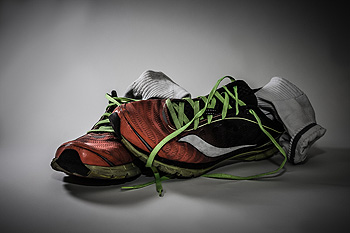 If you have noticed excessive sweat coming from your feet, you may have a medical condition that is known as plantar hyperhidrosis. It can occur as a result of an overactive nervous system, obesity, or a thyroid disorder. There are disadvantages to having this condition, including slipping in open shoes that may cause the ankle to twist, or the foot slipping off the brake while attempting to stop the car. There are treatment options that do not require surgery which may help to obtain mild relief. These can include taking anti-anxiety drugs, botox injections, or taking specific medications that can induce drying. For severe cases, surgery may be a viable option which can include cutting the affected nerve. If you are suffering from this uncomfortable condition, it is strongly advised that you speak to a podiatrist who can offer the best treatment for you.
If you have noticed excessive sweat coming from your feet, you may have a medical condition that is known as plantar hyperhidrosis. It can occur as a result of an overactive nervous system, obesity, or a thyroid disorder. There are disadvantages to having this condition, including slipping in open shoes that may cause the ankle to twist, or the foot slipping off the brake while attempting to stop the car. There are treatment options that do not require surgery which may help to obtain mild relief. These can include taking anti-anxiety drugs, botox injections, or taking specific medications that can induce drying. For severe cases, surgery may be a viable option which can include cutting the affected nerve. If you are suffering from this uncomfortable condition, it is strongly advised that you speak to a podiatrist who can offer the best treatment for you.
If you are suffering from hyperhidrosis contact Dr. Kevin Davis of Davis Foot & Ankle Centers. Our doctor can provide the care you need to attend to all of your foot and ankle needs.
Hyperhidrosis of the Feet
Hyperhidrosis is a rare disorder that can cause people to have excessive sweating of their feet. This can usually occur all on its own without rigorous activity involved. People who suffer from hyperhidrosis may also experience sweaty palms.
Although it is said that sweating is a healthy process meant to cool down the body temperature and to maintain a proper internal temperature, hyperhidrosis may prove to be a huge hindrance on a person’s everyday life.
Plantar hyperhidrosis is considered to be the main form of hyperhidrosis. Secondary hyperhidrosis can refer to sweating that occurs in areas other than the feet or hands and armpits. Often this may be a sign of it being related to another medical condition such as menopause, hyperthyroidism and even Parkinson’s disease.
In order to alleviate this condition, it is important to see your doctor so that they may prescribe the necessary medications so that you can begin to live a normal life again. If this is left untreated, it is said that it will persist throughout an individual’s life.
A last resort approach would be surgery, but it is best to speak with your doctor to find out what may be the best treatment for you.
If you have any questions please feel free to contact our office located in Springfield, TN . We offer the newest diagnostic and treatment technologies for all your foot and ankle needs.
Foot Ulcers and Diabetes
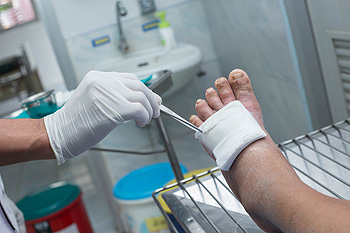 Patients with diabetes are often familiar with foot conditions that can develop as a result of this affliction. Research has indicated the importance of having regular foot examinations, as this can be helpful in noticing any cuts or wounds that have developed on the feet. Diabetes can produce tingling and numbing sensations in the feet. This may cause difficulty in feeling any cuts that are present on the feet, which can lead to infections. If the cuts are not properly cared for, foot ulcers may develop and gangrene may gradually develop. If you have diabetes, it is advised that you be under the care of a podiatrist who can manage this condition.
Patients with diabetes are often familiar with foot conditions that can develop as a result of this affliction. Research has indicated the importance of having regular foot examinations, as this can be helpful in noticing any cuts or wounds that have developed on the feet. Diabetes can produce tingling and numbing sensations in the feet. This may cause difficulty in feeling any cuts that are present on the feet, which can lead to infections. If the cuts are not properly cared for, foot ulcers may develop and gangrene may gradually develop. If you have diabetes, it is advised that you be under the care of a podiatrist who can manage this condition.
Diabetic foot care is important in preventing foot ailments such as ulcers. If you are suffering from diabetes or have any other concerns about your feet, contact Dr. Kevin Davis from Davis Foot & Ankle Centers. Our doctor can provide the care you need to keep you pain-free and on your feet.
Diabetic Foot Care
Diabetes affects millions of people every year. The condition can damage blood vessels in many parts of the body, especially the feet. Because of this, taking care of your feet is essential if you have diabetes, and having a podiatrist help monitor your foot health is highly recommended.
The Importance of Caring for Your Feet
- Routinely inspect your feet for bruises or sores.
- Wear socks that fit your feet comfortably.
- Wear comfortable shoes that provide adequate support.
Patients with diabetes should have their doctor monitor their blood levels, as blood sugar levels play such a huge role in diabetic care. Monitoring these levels on a regular basis is highly advised.
It is always best to inform your healthcare professional of any concerns you may have regarding your feet, especially for diabetic patients. Early treatment and routine foot examinations are keys to maintaining proper health, especially because severe complications can arise if proper treatment is not applied.
If you have any questions please feel free to contact our office located in Springfield, TN . We offer the newest diagnostic and treatment technologies for all your foot and ankle needs.
Is Being Overweight Detrimental to the Health of the Feet?
 Patients who are overweight may notice they frequently experience foot pain. This can be a result of the added weight the feet must endure on a daily basis. Additionally, there are uncomfortable foot conditions that may develop which can include plantar fasciitis, arthritis, and tendinitis. These can compromise the ability to complete daily activities. Obese patients may have flat feet, and this may produce considerable pain and discomfort. Other medical conditions that can develop from being overweight are gout, diabetes, and circulation ailments. If you have questions about how obesity can affect the feet, it is strongly advised that you seek the counsel of a podiatrist.
Patients who are overweight may notice they frequently experience foot pain. This can be a result of the added weight the feet must endure on a daily basis. Additionally, there are uncomfortable foot conditions that may develop which can include plantar fasciitis, arthritis, and tendinitis. These can compromise the ability to complete daily activities. Obese patients may have flat feet, and this may produce considerable pain and discomfort. Other medical conditions that can develop from being overweight are gout, diabetes, and circulation ailments. If you have questions about how obesity can affect the feet, it is strongly advised that you seek the counsel of a podiatrist.
The more you weigh, the harder your feet must work to support your body. If you’re an obese individual and are concerned about your feet, contact Dr. Kevin Davis from Davis Foot & Ankle Centers. Our doctor can provide the care you need to keep you pain-free and on your feet.
Obesity and Your Feet
People who are overweight are putting more pressure on their ankles, knees, and hips as well as their feet. This unfortunately can lead to variety of different issues.
Problems & Complications Stemming from Obesity
- When the body is overweight, it tries to compensate by changing the way that it moves. An obese person may lean forward and put extra weight on the wrong part of the foot. This puts unnecessary stress on the feet.
- Obese people are also more likely to develop type II diabetes which is a condition that causes a lot of foot problems. People with diabetes often don’t feel the cuts and sores that they may have on their feet, which can lead to more complicated and severe issues.
- Plantar fasciitis is another foot condition that can be caused by obesity. Plantar fasciitis is an inflammation of the tissue along the bottom of the foot, which causes pain and stiffness while walking and climbing stairs.
If you have any questions, please feel free to contact our office located in Springfield, TN . We offer the newest diagnostic and treatment technologies for all your foot care needs.
When to Purchase Shoes
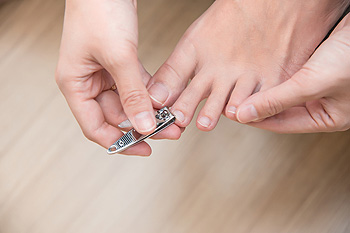 The feet are considered to be the foundation of the body, and it is important to maintain proper foot care. This includes washing and drying your feet completely, which may be beneficial in preventing athlete’s foot from developing. Foot odor may be avoided when the socks are changed daily. The overall feeling of the feet may improve when proper size shoes are worn. Research has indicated it is beneficial to purchase shoes in the afternoon, when the feet are at their largest. Additionally, it is helpful to wear high heels and flip flops for limited amounts of time because of the inadequate support these shoes typically provide. If you would like additional information about how to care for you feet, it is suggested that you schedule a consultation with a podiatrist who can provide you with the correct knowledge.
The feet are considered to be the foundation of the body, and it is important to maintain proper foot care. This includes washing and drying your feet completely, which may be beneficial in preventing athlete’s foot from developing. Foot odor may be avoided when the socks are changed daily. The overall feeling of the feet may improve when proper size shoes are worn. Research has indicated it is beneficial to purchase shoes in the afternoon, when the feet are at their largest. Additionally, it is helpful to wear high heels and flip flops for limited amounts of time because of the inadequate support these shoes typically provide. If you would like additional information about how to care for you feet, it is suggested that you schedule a consultation with a podiatrist who can provide you with the correct knowledge.
Everyday foot care is very important to prevent infection and other foot ailments. If you need your feet checked, contact Dr. Kevin Davis from Davis Foot & Ankle Centers. Our doctor can provide the care you need to keep you pain-free and on your feet.
Everyday Foot Care
Often, people take care of their bodies, face and hair more so than they do for their feet. But the feet are a very important aspect of our bodies, and one that we should pay more attention to. Without our feet, we would not be able to perform most daily tasks.
It is best to check your feet regularly to make sure there are no new bruises or cuts that you may not have noticed before. For dry feet, moisturizer can easily be a remedy and can be applied as often as necessary to the affected areas. Wearing shoes that fit well can also help you maintain good foot health, as well as making it easier to walk and do daily activities without the stress or pain of ill-fitting shoes, high heels, or even flip flops. Wearing clean socks with closed shoes is important to ensure that sweat and bacteria do not accumulate within the shoe. Clean socks help to prevent Athlete’s foot, fungi problems, bad odors, and can absorb sweat.
If you have any questions please feel free to contact our office located in Springfield, TN . We offer the newest diagnostic and treatment technologies for all your foot and ankle needs.
Symptoms of an Achilles Tendon Injury
 If you are experiencing pain in the calf and in the back of the heel, you may have what is known as an Achilles tendon injury. This type of injury can produce severe discomfort, and it may be difficult to walk. It is a common ailment among people who enjoy running, and may occur from a lack of stretching the muscles before running or jogging begins. Additionally, it may develop as a result of wearing shoes that do not fit correctly, or from an abrupt change in participating in sporting activities. The Achilles tendon connects the heel to the calf muscles, and if it should become inflamed, Achilles tendinopathy may occur. Some of the symptoms that are associated with this type of injury can include stiffness in the ankle and calf, and the first steps taken after arising in the morning may be uncomfortable. If you have any pain in the heel and the calf, it is strongly suggested that you speak to a podiatrist as quickly as possible who can properly diagnosis and treat an Achilles tendon injury.
If you are experiencing pain in the calf and in the back of the heel, you may have what is known as an Achilles tendon injury. This type of injury can produce severe discomfort, and it may be difficult to walk. It is a common ailment among people who enjoy running, and may occur from a lack of stretching the muscles before running or jogging begins. Additionally, it may develop as a result of wearing shoes that do not fit correctly, or from an abrupt change in participating in sporting activities. The Achilles tendon connects the heel to the calf muscles, and if it should become inflamed, Achilles tendinopathy may occur. Some of the symptoms that are associated with this type of injury can include stiffness in the ankle and calf, and the first steps taken after arising in the morning may be uncomfortable. If you have any pain in the heel and the calf, it is strongly suggested that you speak to a podiatrist as quickly as possible who can properly diagnosis and treat an Achilles tendon injury.
Achilles tendon injuries need immediate attention to avoid future complications. If you have any concerns, contact Dr. Kevin Davis of Davis Foot & Ankle Centers. Our doctor can provide the care you need to keep you pain-free and on your feet.
What Is the Achilles Tendon?
The Achilles tendon is a tendon that connects the lower leg muscles and calf to the heel of the foot. It is the strongest tendon in the human body and is essential for making movement possible. Because this tendon is such an integral part of the body, any injuries to it can create immense difficulties and should immediately be presented to a doctor.
What Are the Symptoms of an Achilles Tendon Injury?
There are various types of injuries that can affect the Achilles tendon. The two most common injuries are Achilles tendinitis and ruptures of the tendon.
Achilles Tendinitis Symptoms
- Inflammation
- Dull to severe pain
- Increased blood flow to the tendon
- Thickening of the tendon
Rupture Symptoms
- Extreme pain and swelling in the foot
- Total immobility
Treatment and Prevention
Achilles tendon injuries are diagnosed by a thorough physical evaluation, which can include an MRI. Treatment involves rest, physical therapy, and in some cases, surgery. However, various preventative measures can be taken to avoid these injuries, such as:
- Thorough stretching of the tendon before and after exercise
- Strengthening exercises like calf raises, squats, leg curls, leg extensions, leg raises, lunges, and leg presses
If you have any questions please feel free to contact our office located in Springfield, TN . We offer the newest diagnostic tools and technology to treat your foot and ankle needs.
Washington Baseman Deals with Plantar Fasciitis Recovery
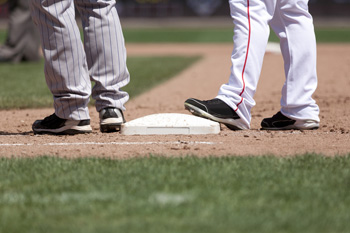 First baseman Ryan Zimmerman of the Washington Nationals has suffered a “brutal” season due to plantar fasciitis in his right foot. The condition made Zimmerman’s returns to the field slow. The nature of the athlete’s injury has also made it slow to heal; fully torn plantar fascia are faster to heal, but Zimmerman’s fascia was only partly torn. Before his return on September 1st, Zimmerman rehabilitated on the treadmill. Plantar fasciitis is a common sports injury that can be disruptive to everyday life. If you think you’ve sustained a plantar fasciitis injury, contact your podiatrist.
First baseman Ryan Zimmerman of the Washington Nationals has suffered a “brutal” season due to plantar fasciitis in his right foot. The condition made Zimmerman’s returns to the field slow. The nature of the athlete’s injury has also made it slow to heal; fully torn plantar fascia are faster to heal, but Zimmerman’s fascia was only partly torn. Before his return on September 1st, Zimmerman rehabilitated on the treadmill. Plantar fasciitis is a common sports injury that can be disruptive to everyday life. If you think you’ve sustained a plantar fasciitis injury, contact your podiatrist.
Plantar fasciitis can be very painful and inconvenient. If you are experiencing heel pain or symptoms of plantar fasciitis, contact Dr. Kevin Davis from Davis Foot & Ankle Centers. Our doctor can provide the care you need to keep you pain-free and on your feet.
What Is Plantar Fasciitis?
Plantar fasciitis is the inflammation of the thick band of tissue that runs along the bottom of your foot, known as the plantar fascia, and causes mild to severe heel pain.
What Causes Plantar Fasciitis?
- Excessive running
- Non-supportive shoes
- Overpronation
- Repeated stretching and tearing of the plantar fascia
How Can It Be Treated?
- Conservative measures – anti-inflammatories, ice packs, stretching exercises, physical therapy, orthotic devices
- Shockwave therapy – sound waves are sent to the affected area to facilitate healing and are usually used for chronic cases of plantar fasciitis
- Surgery – usually only used as a last resort when all else fails. The plantar fascia can be surgically detached from the heel
While very treatable, plantar fasciitis is definitely not something that should be ignored. Especially in severe cases, speaking to your doctor right away is highly recommended to avoid complications and severe heel pain. Your podiatrist can work with you to provide the appropriate treatment options tailored to your condition.
If you have any questions please feel free to contact our office located in Springfield, TN . We offer the newest diagnostic and treatment technologies for all your foot and ankle needs.
